BLACKEAGLE
SENIOR MEMBER
Terror on the high seas: Egyptian navy vessel erupts in huge fireball as ISIS carry out rocket strike on patrol ship in the Mediterranean
Published: 14:00 GMT, 16 July 2015 | Updated: 14:29 GMT, 16 July 2015
Extremists loyal to the Islamic State in Egypt have attacked a naval patrol ship in the Mediterranean Sea, causing it to burst into flames.
The Egyptian military said earlier a coastguard vessel had exchanged shots with militants just two miles off the coast of northern Sinai, an area bordering Israel and the Gaza Strip.
There were no fatalities among the vessel's crew in the shootout with the terrorists, according to a Facebook message posted by military spokesman, Brigadier General Mohammed Samir.
ISIS declared their presence on Sinai - a peninsula popular with British holidaymakers - last November when up to 2,000 members of the already established jihadi group Ansar Bait al-Maqdis swore allegiance to ISIS' leader Abu Bakr al-Baghdadi.
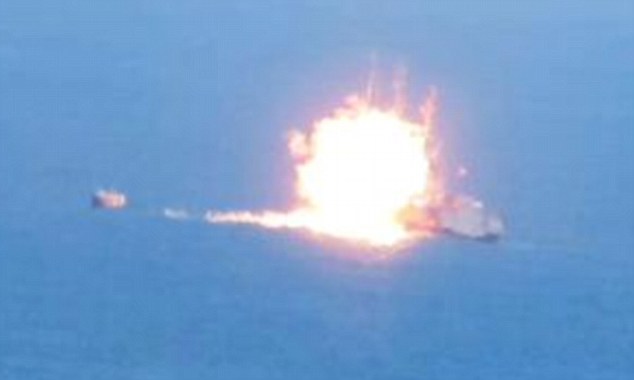
Explosion: Extremists loyal to the Islamic State in Egypt have attacked a naval patrol ship in the Mediterranean Sea, causing it to burst into flames
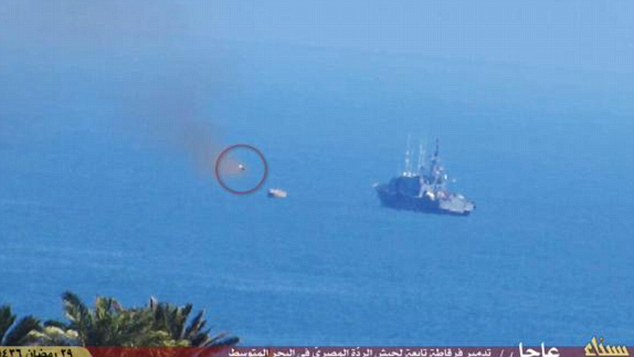
Attack: Eyewitnesses said a boat patrolling the Sinai coastline spotted a group of ISIS jihadis on the shore and engaged them. A rocket fired from the shore (circled) struck the vessel moments later
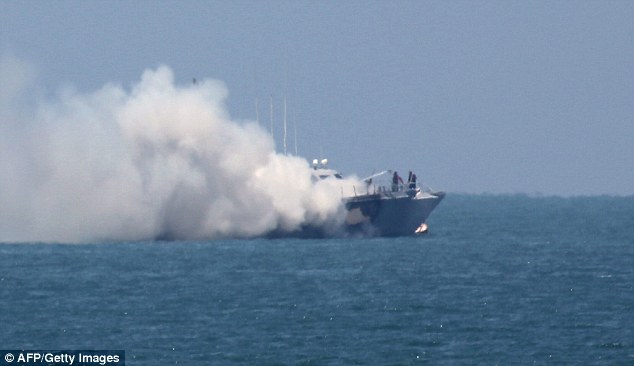
Smoke: A witness, fisherman Abu Ibrahim Mohammed from the neighboring Gaza Strip, said the vessel was a gunboat that was about a nautical mile off the coast when it was struck by the rocket
Eyewitnesses said a boat patrolling the Sinai coastline spotted a group of ISIS jihadis on the shore and engaged them.
At some point during the fire fight the vessel was struck by a rocket, causing it to burst into flames and withdraw from the battle.
The military said it suffered no casualties although it is understood several patrol workers suffered minor burn injuries.
An AFP photographer and a witness in the Palestinian Gaza Strip, just across the border, said the boat was struck at least two miles from shore.
'We were sitting on the beach and suddenly there was an explosion,' said Ahmed Nofal.
Other navy boats came to rescue the crew as their vessel spewed a plume of smoke.
A witness, fisherman Abu Ibrahim Mohammed from the neighboring Gaza Strip, said the vessel was a gunboat that was about a nautical mile off the coast when it was struck by the rocket.
He did not hear the explosion but saw two smaller boats later trying to put out the fire and that a third, larger one later arrived and towed the burned vessel away.
Two speed boats were seen later combing the area as gunshots occasionally rang out, he added.
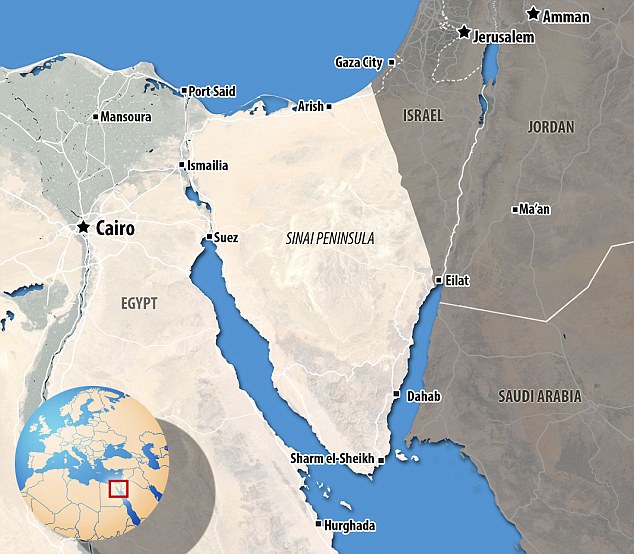
Location: The Egyptian military said earlier a coastguard vessel had exchanged shots with militants just two miles off the coast of northern Sinai, an area bordering Israel and the Gaza Strip
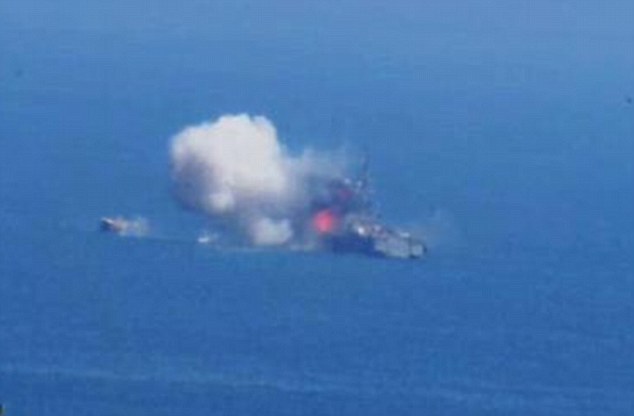
Blast: The military said it suffered no casualties although it is understood several patrol workers suffered minor burn injuries
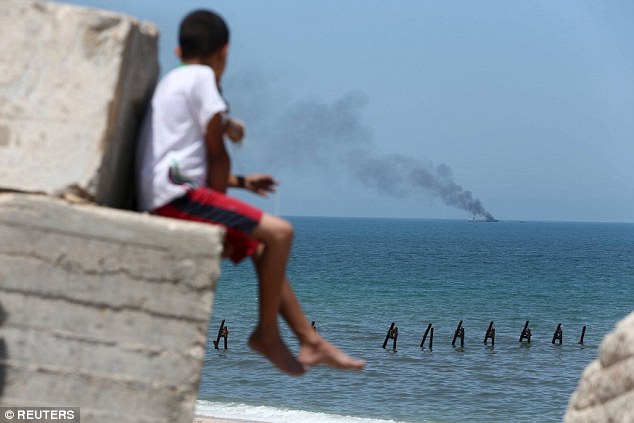
A Palestinian boy watches smoke rising from the Egyptian patrol vessel off the coast of northern Sinai
Authorities refused to officially confirm whether or not the vessel was hit by a rocket but said they are looking into both that possibility as well as theory that ISIS jihadis could have swam out to the patrol ship and placed explosives on it, which were later detonated by remote control.
In his Facebook message Samir did not say how much damage the vessel suffered and gave no details on the type of ship or the size of its crew.
The vessel, according to the security officials, routinely patrols Egyptian territorial waters and has frequently been used to transport army and police personnel to mainland Egypt.
The sea route avoids the overland journey through Sinai, where ISIS targets government forces.
Jihadis loyal to ISIS have killed scores of soldiers and policemen in the peninsula since the army's overthrow of Islamist president Mohamed Morsi in 2013.
The militants have also carried out attacks west of the Suez Canal, which separates the Sinai from the rest of Egypt.
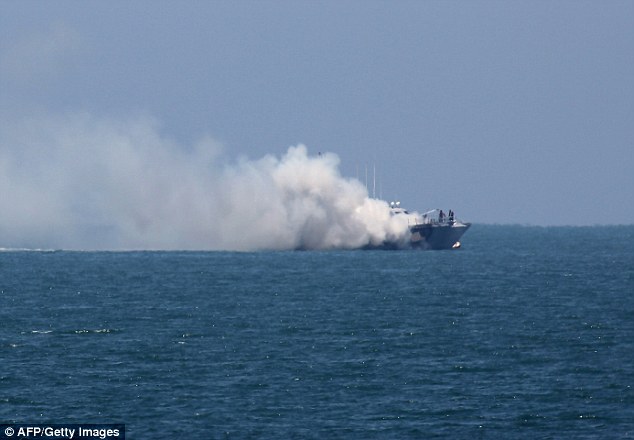
Stricken: Authorities refused to officially confirm whether or not the vessel was hit by a rocket but confirmed that they are looking into the possibility
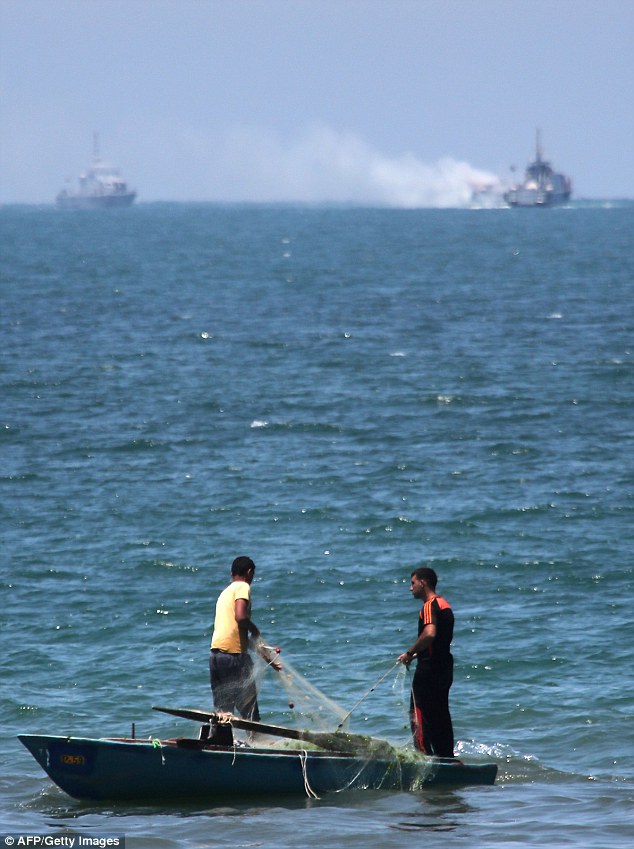
Palestinian fishermen go about their business as an Egyptian naval vessel approaches the stricken patrol ship
Yesterday, the military said it foiled an attempted attack on a military post on a highway linking Cairo with the Red Sea coast.
The driver of a car that was carrying 1,100 pounds of dynamite refused to stop at a checkpoint, drawing fire from the troops, the military said.
The car then swerved off the road and the driver was killed, the military said in a statement.
Egypt faces threats from multiple insurgent factions, including the ISIS affiliate in Sinai, which the military says killed at least 17 soldiers in a July 1 assault there.
Officials from several branches of Egypt's security forces previously said that that attack killed dozens more.
In another attack claimed by ISIS, Egypt's state prosecutor, Hisham Barakat, was assassinated in Cairo by a car bomb in late June.
Terror on the high seas: Egyptian navy vessel erupts in huge fireball as ISIS carry out rocket strike on patrol ship in the Mediterranean | Daily Mail Online
- Patrol ship spotted ISIS jihadis on the Sinai shoreline and fired at them
- The group of Islamic extremists returned fire using high-powered rockets
- At least one of the rockets struck the ship, causing it to burst into flames
- Several patrol workers suffered burn injuries, but there were no fatalities
Published: 14:00 GMT, 16 July 2015 | Updated: 14:29 GMT, 16 July 2015
Extremists loyal to the Islamic State in Egypt have attacked a naval patrol ship in the Mediterranean Sea, causing it to burst into flames.
The Egyptian military said earlier a coastguard vessel had exchanged shots with militants just two miles off the coast of northern Sinai, an area bordering Israel and the Gaza Strip.
There were no fatalities among the vessel's crew in the shootout with the terrorists, according to a Facebook message posted by military spokesman, Brigadier General Mohammed Samir.
ISIS declared their presence on Sinai - a peninsula popular with British holidaymakers - last November when up to 2,000 members of the already established jihadi group Ansar Bait al-Maqdis swore allegiance to ISIS' leader Abu Bakr al-Baghdadi.

Explosion: Extremists loyal to the Islamic State in Egypt have attacked a naval patrol ship in the Mediterranean Sea, causing it to burst into flames

Attack: Eyewitnesses said a boat patrolling the Sinai coastline spotted a group of ISIS jihadis on the shore and engaged them. A rocket fired from the shore (circled) struck the vessel moments later

Smoke: A witness, fisherman Abu Ibrahim Mohammed from the neighboring Gaza Strip, said the vessel was a gunboat that was about a nautical mile off the coast when it was struck by the rocket
Eyewitnesses said a boat patrolling the Sinai coastline spotted a group of ISIS jihadis on the shore and engaged them.
At some point during the fire fight the vessel was struck by a rocket, causing it to burst into flames and withdraw from the battle.
The military said it suffered no casualties although it is understood several patrol workers suffered minor burn injuries.
An AFP photographer and a witness in the Palestinian Gaza Strip, just across the border, said the boat was struck at least two miles from shore.
'We were sitting on the beach and suddenly there was an explosion,' said Ahmed Nofal.
Other navy boats came to rescue the crew as their vessel spewed a plume of smoke.
A witness, fisherman Abu Ibrahim Mohammed from the neighboring Gaza Strip, said the vessel was a gunboat that was about a nautical mile off the coast when it was struck by the rocket.
He did not hear the explosion but saw two smaller boats later trying to put out the fire and that a third, larger one later arrived and towed the burned vessel away.
Two speed boats were seen later combing the area as gunshots occasionally rang out, he added.

Location: The Egyptian military said earlier a coastguard vessel had exchanged shots with militants just two miles off the coast of northern Sinai, an area bordering Israel and the Gaza Strip

Blast: The military said it suffered no casualties although it is understood several patrol workers suffered minor burn injuries

A Palestinian boy watches smoke rising from the Egyptian patrol vessel off the coast of northern Sinai
Authorities refused to officially confirm whether or not the vessel was hit by a rocket but said they are looking into both that possibility as well as theory that ISIS jihadis could have swam out to the patrol ship and placed explosives on it, which were later detonated by remote control.
In his Facebook message Samir did not say how much damage the vessel suffered and gave no details on the type of ship or the size of its crew.
The vessel, according to the security officials, routinely patrols Egyptian territorial waters and has frequently been used to transport army and police personnel to mainland Egypt.
The sea route avoids the overland journey through Sinai, where ISIS targets government forces.
Jihadis loyal to ISIS have killed scores of soldiers and policemen in the peninsula since the army's overthrow of Islamist president Mohamed Morsi in 2013.
The militants have also carried out attacks west of the Suez Canal, which separates the Sinai from the rest of Egypt.

Stricken: Authorities refused to officially confirm whether or not the vessel was hit by a rocket but confirmed that they are looking into the possibility

Palestinian fishermen go about their business as an Egyptian naval vessel approaches the stricken patrol ship
Yesterday, the military said it foiled an attempted attack on a military post on a highway linking Cairo with the Red Sea coast.
The driver of a car that was carrying 1,100 pounds of dynamite refused to stop at a checkpoint, drawing fire from the troops, the military said.
The car then swerved off the road and the driver was killed, the military said in a statement.
Egypt faces threats from multiple insurgent factions, including the ISIS affiliate in Sinai, which the military says killed at least 17 soldiers in a July 1 assault there.
Officials from several branches of Egypt's security forces previously said that that attack killed dozens more.
In another attack claimed by ISIS, Egypt's state prosecutor, Hisham Barakat, was assassinated in Cairo by a car bomb in late June.
Terror on the high seas: Egyptian navy vessel erupts in huge fireball as ISIS carry out rocket strike on patrol ship in the Mediterranean | Daily Mail Online





